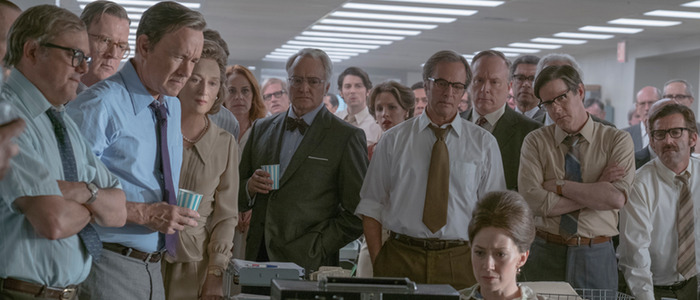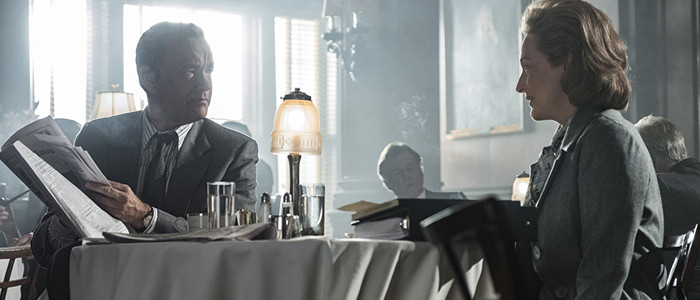Hanks And Spielberg (And Streep) Save America, One Movie At A Time
In such a fraught year as 2017, it's hard for The Post — about pioneering journalists reporting a shocking truth that the American government wants to keep hidden, starring two of the biggest movie stars on the planet and directed by the most distinguished filmmaker of modern American cinema — not to feel Very Important™. Of course, Very Important™ Movies often feel very stodgy and lifeless, more notable for the well-intentioned people behind the project as well as the subject matter than for being lively and as vital as the subject matter itself.
Steven Spielberg's The Post has the unique benefit of not only being Very Important™ but also feeling exciting and urgent, a reflection and refraction of our current state that is at once damning and thrilling. It's also pleasingly familiar, as Spielberg is once again working with Tom Hanks, his go-to acting collaborator when depicting intense periods of 20th-century American history, though in a fresh, somewhat overdue new context.
The Avatar of Spielberg’s American History
If Spielberg's later career is most recognizable via his attempts to fictionally document major historical moments of the American 20th century, then Hanks has been his folksy avatar, the Jimmy Stewart to his Frank Capra. Steven Spielberg has spent a good chunk of his whole career, all the way from the rollicking and goofy 1941 to recent epics such as Lincoln, focusing on world history. But within the last 20 years, he has continually gravitated towards making films that appeal less to younger audiences (as when he made Jaws, E.T., Raiders of the Lost Ark, and others in his earlier films), and more to the prototypical American dad. And who better to portray the prototypical American dad in Spielberg's films than Hanks? From Saving Private Ryan to The Terminal to Bridge of Spies and now as hard-nosed newspaper editor Ben Bradlee in The Post, Hanks has been in consistent harmony with Spielberg within these cinematic treatises on modern history.
Bradlee is a slightly gruffer character than you might expect from Hanks — though not quite as prickly as the awkward federal agent he played in the delightful Catch Me If You Can — but very much in line with the morally righteous heroes of Saving Private Ryan and Bridge of Spies. Ben Bradlee, as the editor of The Washington Post in the late 1960s and early 1970s, is struggling to jockey for room at the center of a massive political scandal: the secret unveiling of the Pentagon Papers, which revealed how the American government lied to the public for decades about its need to wage war in Southeast Asia. Yet even in such a high-stakes situation, the way Hanks plays Bradlee can be best summed up in a line he says to his character's secretary at one point of high intrigue: "God, what fun!"
Hanks does not have the showiest role in The Post; despite having a bit of an early-70s-style hairstyle going on and a bit of rasp in his voice, it's otherwise a character cut from the same cloth as Carl Hanratty, James B. Donovan, and Army Captain John H. Miller. Bradlee, as is suggested in his various tete-a-tetes with Graham, was a bit too buddy-buddy with John F. Kennedy before his 1963 assassination, but is otherwise guided by a clear and inarguable sense of moral right and wrong. Of course, anyone with a passing familiarity of American history of the 1970s knows how this struggle will be resolved, both for the Post and for American newspapers overall, but the way Hanks imbues Bradlee with a firm moral compass feels borne out of natural characterization instead of a foregone historical conclusion.
Sharing the Spotlight
Unlike Hanks' and Spielberg's previous collaborations, however, The Post isn't squarely focused on Bradlee's journalistic efforts. Of course, when we think of the Washington Post in conjunction with Richard Nixon's tumultuous presidency, we think of the Watergate scandal and the ensuing coverage by Bob Woodward and Carl Bernstein, as dramatized in All the President's Men. But The Post, written by Liz Hannah and Josh Singer (the latter co-wrote the 2015 Best Picture winner Spotlight, whose straightforward dramatics are equally present here), suggests that before the Washington Post could be a titan of journalism capable of helping take down the president, they had to establish themselves as more than a local paper that was conveniently located near the White House. Hanks-as-Bradlee is part of how Spielberg is able to bring this story to life, but The Post is just as much about the paper's publisher as its editor.
In 1971, Katharine Graham (Meryl Streep), a woman striving to move forward in an ink-stained world of men, tries to balance two aims. First, there's her desire to put The Washington Post on the American stock exchange as a public offering; second, there's her belief that the paper should stand as a bastion of the free press, exemplified by Bradlee and his writers' attempts to establish the Post as something as powerful as the New York Times. Her paper's executive board, otherwise peopled by men, treats her as an afterthought; only when a male compatriot of hers echoes the points she makes do they pay attention. When the latter paper begins publishing a series of revealing government documents known as the Pentagon Papers, passed to them in secret by a U.S. military analyst, Graham worries that it may endanger the paper's financial future even as she realizes that it may establish the Post as a force to be reckoned with.
What makes The Post stand out among the various Hanks/Spielberg collaborations is not that it's a massive ensemble film. Saving Private Ryan, nearly 20 years ago, was an equally epic-scale film that featured young turks like Vin Diesel, Adam Goldberg, Edward Burns, Matt Damon, as well as character actors like Bryan Cranston, Paul Giamatti, and more. The Terminal co-stars Stanley Tucci, Zoe Saldana, Chi McBride, Kumar Pallana, Diego Luna, Barry Shabaka Henley, and more. Catch Me If You Can co-starred Leonardo DiCaprio, Christopher Walken, James Brolin, Amy Adams, and Martin Sheen. But The Post is perhaps the most stacked ensemble Spielberg has worked with in years, if only because the cast features many actors at the peaks of their respective fame, from Bob Odenkirk, fresh off Better Call Saul; Carrie Coon, of Fargo and The Leftovers; Bradley Whitford; Michael Stuhlbarg, who co-stars in this and two other possible Best Picture contenders this year; and more. All that aside, The Post relies as much on its true star — who else but Streep? — as it does on Hanks.
Meryl Streep has only worked with Spielberg once before, delivering a vocal cameo in the vastly underrated AI: Artificial Intelligence. Here, as Kay Graham, she gets a meaty, if subtly complex character arc that transpires over only a few days, primarily on the eve of a day when the Post may publish a new part of the Pentagon Papers story that could get the Post's reporters, Bradlee, and Graham all thrown in jail. The story of the Pentagon Papers and the reaction of the bloviating Richard Nixon — depicted here through actual audiotape of the president as well as far-off shots of him stewing in the White House — is resonant enough. The phrase "fake news" is not uttered here, but it might as well be hurled around when the Justice Department tries to stop the New York Times (and, by extension, the Post) from further publishing any more documents. However, the way Streep plays Kay Graham is even more pointed and poignant a year after the 2016 presidential election.
A New Chapter
Graham holds the true seat of power at the Post, yet is initially unsure of herself and steamrolled by the many men who make up the board of directors of the company she inherited after her husband committed suicide. By the end of the film, Graham has gained a sense of resolve, representing the same confidence and trust in the freedom of the press as Bradlee and his dogged staff of journalists. Streep, so gifted yet frequently playing more self-assured women, beautifully portrays Graham's shift throughout. Hanks is billed second on the ads for The Post, and it makes perfect sense; his character's arc is essentially learning to appreciate the necessity of having someone as gradually confident and fiercely loyal to the paper as Katharine Graham. Graham herself—through her eventual embrace of the power of the press, especially during controversial times—reflects the heroic stance within the film. If Hanks is America's Dad, then his presence here is to further acknowledge that it's time for men like him to cede the spotlight to more women.
Spielberg has spent a number of his last films wading through American history, from Lincoln to Bridge of Spies. With The Post, a film that he made this summer during the post-production process of his upcoming Ready Player One, he has created something with the same sense of propulsive urgency that presumably drove the filming process. The stakes in The Post could not be higher, not only because of how disturbingly relevant its content is to our present situation. That relevance is even more powerful as Hollywood continues to grapple with the pervasive sexual harassment occurring throughout the industry; The Post may not be about that topic directly, but there is a very real sense of Spielberg embracing what Bradlee embraces at the end about the importance of women like Kay Graham.
Perhaps it's fitting that, even as Spielberg teamed up with Tom Hanks again, The Post represents a bit of a long-overdue passing of the torch from these two icons. In both Bridge of Spies and The Post, Hanks' character is married, but the two wives are played by actresses (Amy Ryan and Sarah Paulson, respectively) whose talent vastly outpaces the material they're given. Paulson, at least, gets a more loaded monologue in The Post, in which her character essentially reminds Bradlee of the sacrifices Graham makes on a daily basis, even for someone so rich and so powerful. It's this moment that allows Bradlee to appreciate Graham innately, even as she appreciates the role he plays at her newspaper. This come-to-Jesus moment is both welcome and distinctive; you wonder how much it speaks to elder cinematic statesmen like Spielberg and Hanks, realizing how much the women in their industry sacrifice to get a seat at the table.
As much as he is known for making genre entertainments, terrifying us with sharks, dinosaurs, aliens, and more, Steven Spielberg is one of the more prominent auteurs of American history. As with his other collaborations with Tom Hanks, as well as other political pieces like Lincoln and Munich, there is an unerring sense throughout The Post that the characters within the story are aware that history is unfolding around them, that they are among its key players at this given moment. The most graceful, powerful image in the film, suggesting a sense of the weight and gravity of this historical flashpoint, comes near its close, focusing on Streep, not Hanks. Graham walks down the steps of a courthouse, head held high in the middle of a media scrum surrounded by war protesters. She walks past a series of young women, all protesters who look at her with awe and inspiration. The sense of unity across generations here may be an idealized fantasy, but a moving one nonetheless. And it displays an awareness from Spielberg about the layered timeliness of this story: it's not just about the power of journalism. The Post is equally about the power women can wield when given the chance.


